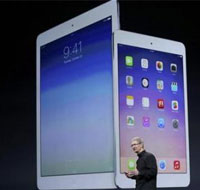23 Oct 2013 - {{hitsCtrl.values.hits}}
 Apple Inc on Tuesday offered free upgrades for life on its operating system and business software, and unveiled thinner iPads and faster Mac computers ahead of a competitive holiday shopping season.
Apple Inc on Tuesday offered free upgrades for life on its operating system and business software, and unveiled thinner iPads and faster Mac computers ahead of a competitive holiday shopping season.
24 Dec 2024 9 minute ago
24 Dec 2024 3 hours ago
24 Dec 2024 4 hours ago
24 Dec 2024 4 hours ago
24 Dec 2024 5 hours ago